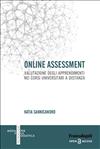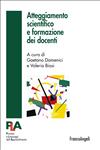
Technologies in training processes by radically modifying the relationship with (and between) knowledge, have determined the need to experiment with new methodological approaches to innovate didactic action, respond to subjective training needs, satisfy the ever increasing requests coming from the job market. In this paper, we want to deepen a particular action of this process, preliminary to the implementation phase of each training intervention. We refer to the needs analysis (NA) aimed at identifying training needs and requirements of the participants with respect to which to organize and modulate the contents and the didactic action. In the opinion of the author, already the NA, if accompanied by specific actions, can constitute an intentionally structured moment to enhance the effectiveness of training feedback in a diagnostic and self-assessment function and in this work we will describe an automated system designed and developed specifically for this purpose. To examine the application opportunities and to show the potential of the automated system, an experience will be presented that involved students attending the specialization course for educational support activities for pupils with disabilities held at the University of Salerno in the A.Y. 2022/2023.





